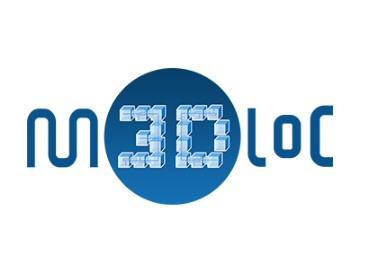Additive manufacturing of 3D microfluidic MEMS for lab-on-a-chip applications
Funding and duration
- European Union’s Horizon 2020 Programme, H2020-NMBP-PILOTS-2017, Research and Innovation action
- European Union’s Horizon 2020 Programme, H2020-NMBP-PILOTS-2017, Research and Innovation action
- January 2018 – December 2021
Website
Consortium

Project goal
MEDLOC aims at the employment of multi-material 3D printing technologies for the large-scale fabrication of microfluidic MEMS for lab-on-a-chip and sensing applications. The concept is based on the combination of multimaterial direct-ink-writing method and an extrusion-based 3D printing pilot line, in order to fabricate microstructured detection devices with the ability to perform all steps of chemical analysis in an automated fashion. The functionality of these devices will be evaluated based on their ability to streamline all steps needed to obtain mobility and binding-based identity information in one continuous biochemical detection system. Optimum in-line control systems will be incorporated in various stages of the fabrication process, to achieve precise control and repeatability. Microfluidic MEMS are increasingly recognized as a unique technology field for the development of biomedical devices (BioMEMS), due to their functional performance on the microscale, at the dimensions of which most physiological processes are operative. Applications near micro- and nanoscale are promising in the field of intelligent biosensors, where it enables the monolithic integration of sensing devices with intelligent functions like molecular detection, signal analysis, electrical stimulation, data transmission, etc., in a single microchip.
Role VITO
The role of VITO is to demonstrate the molecular diagnostic application of the produced bioMEMS lab-on-chip sensor devices in non-small cell lung cancer and tuberculosis. For this functionalities are defined and implemented on the devices to allow for sample preparation and subsequent DNA mutation detection or protein biomarker detection on extracellular vesicles. VITO leads the benchmarking and validation of performance of the final sensor devices for the selected biomedical cases.
